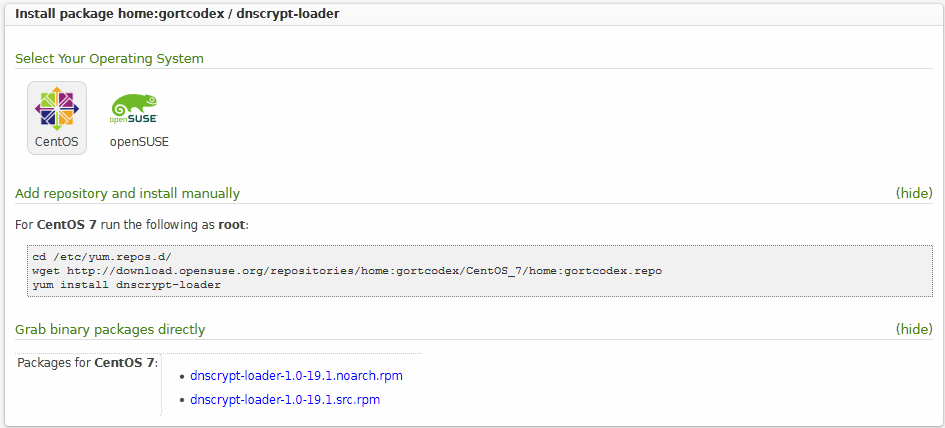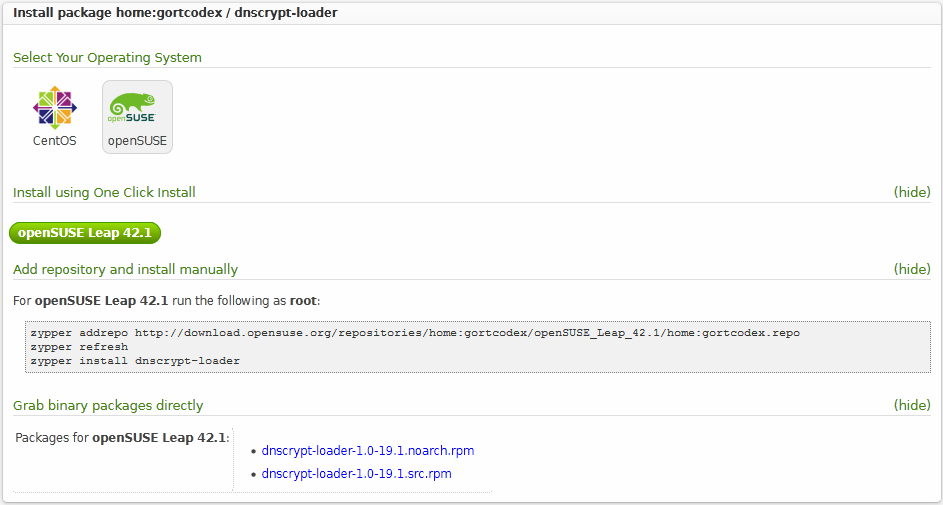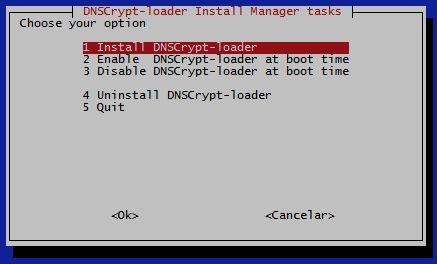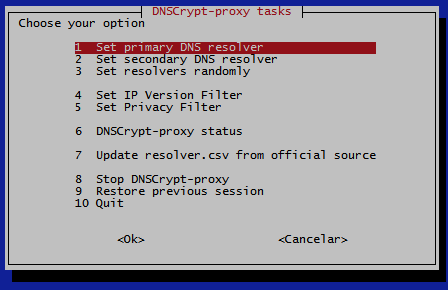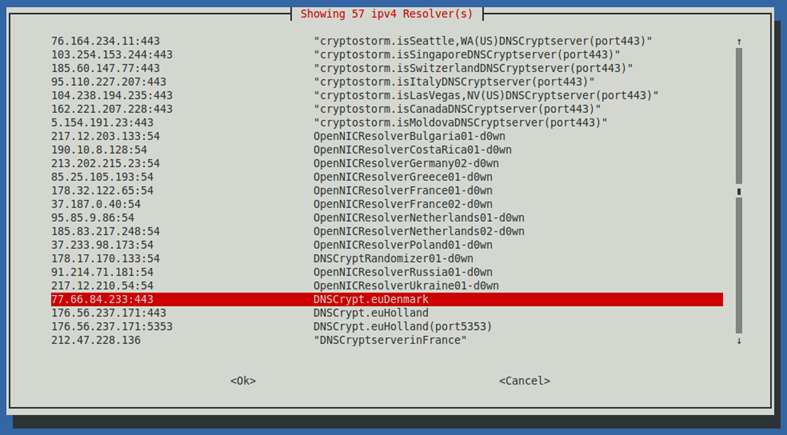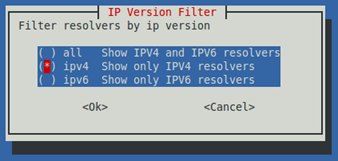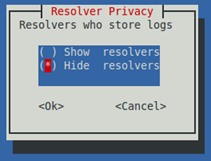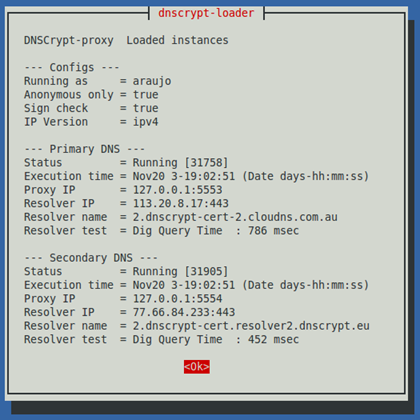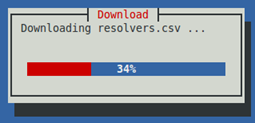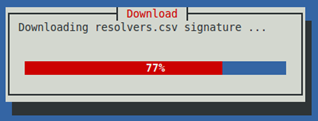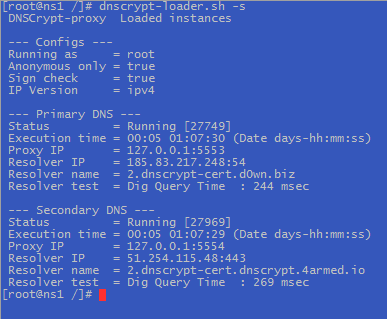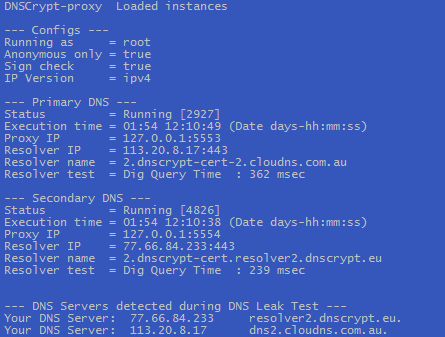- Note: this version is not compatible with dnscrypt-proxy 1.9.4 yet
DNSCrypt-loader is a flexible and customizable bash script to manage DNSCrypt-proxy using command line or Whiptail GUI. If you are system adminitrator or common user this script is a handy way to setup DNSCrypt-proxy on your system
- Has no package dependencies (or almost), to keep it universal and easy to use.
- Runs in text mode, but uses Whiptail/Dialog interface which is pre-installed on most Linux distros.
- Automatic update of resolver.csv file from official source
- Signature verification of resolvers.csv file using
- n. You can enable or disable resolver.csv integrity check.
- Automatic parsing of resolvers.csv file columns used on dnscrypt-proxy daemon execution parameters
- Sets primary and secondary DNS resolvers instances.
- Display of resolvers in a
whiptailmenu, that can be filtered to show only IPV4, IPV6 or show all resolvers. Also, filters resolvers that do not create DNS query logs by default, but you can Change this behavior if you want. - Sets a resolver randomly chosen by the DNSCrypt-loader, very useful for cyclical replacement schedule of resolvers using Cron.
- Can use command-line parameters in a task schedule using Cron or at boot time.
- Start, stop or restart Dnscrypt-proxy daemon by pressing a key or on the command line.
- Display Dnscrypt-proxy status information such as run time, name and IP of the current resolver, DNS resolution speed.
- Generating information in the system log for debugging.
- performs dns leak tests using third party site.
- Provides init script to control DNSCrypt-proxy as service.
- Script to install and uninstall DNSCrypt-loader resources
- Configurable IP/port instances
- Restores resolvers used on last DNSCrypt-proxy session
A successful install of DNSCrypt-proxy.
Optional
A successful install of Minisign (optional but highly recomended)
Please refer to https://github.com/jedisct1/minisign to details.
Commands dependant
whiptail (Pre-installed in most Linux distros)
gawk GNU awk, a pattern scanning and processing language (Pre-installed in most Linux distros)
The scripts were written and tested using CentOS Linux release 7
and should be compatible with most Linux distributions based on Red Hat.
Was tested in Debian based distros with success also.
- CentOS, Fedora
- Ubuntu, Mint, Debian, Kali
- openSUSE
Versions of DNSCrypt-loader for other Linux distros will be available soon.
Scripts that use the Whiptail can be difficult to debug because the interface hides some error messages. For this reason, despite all care on script writing, you can get stuck on a screen without being able to cancel the script, This may force you to cancel an SSH session or kill the frozen process.
Click here to download rpm packages for centOS or openSUSE
and Skip to Prepare configurations topic.
Before installing DNSCrypt-loader install the whiptail (newt package) and the gawk package using your package manager, example:
yum install -y newt gawk
-
Download and unpack DNSCrypt-loader
https://github.com/GortCodex/DNSCrypt-Loader/releases -
Run DNSCrypt-loader installer as root
On CentOS and Red Hat based distros
./install-loader-redhat
On Ubuntu and Debian based distros
sudo ./install-loader-debian
On openSUSE based distros
./install-loader-suse
Option 1 - Install DNSCrypt-loader
Creates config files on /etc/dnscrypt-loader/
Copy the main script dnscrypt-loader to /usr/local/sbin/
Option 2 - Enable DNSCrypt-loader at boot time
If you need to load DNSCrypt-proxy at system start up this option will copy the dcp-loader script to /etc/init.d.
dcp-loader is a basic init script to load DNSCrypt-proxy at boot time
through the DNCrypt-loader.
Please, refer to Using DNSCrypt-loader as service (dcp-loader) topic
Option 3 - Disable DNSCrypt-loader at boot time
Removes the dcp-loader script from /etc/init.d
and disables loading of DNSCrypt-proxy at boot time
Option 4 - Uninstall DNSCrypt-loader
Removes all scripts and config files.
If DNSCrypt-proxy is running it will not be interrupted.
To prevents DNS query errors you need stop the proxy before uninstall.
Before you start using dnscrypt-loader you may want to customize the script to meet your needs.
If you prefer, leave the DNSCrypt-loader using default settings
Edit dnscrypt-loader using your prefered editor
vi /usr/local/sbin/dnscrypt-loader
Please note that after install the dnscrypt-loader you must edit it at
/usr/local/sbin/dnscrypt-loader
What parameters can you modify?
At begining of dnscrypt-loader script locate the Start Customizations block
and configure as following:
The user who execute DNSCrypt-proxy
It is strongly recommended that you change the root user
by an unprivileged user to avoid security problems
cChroot="root"
IPs and ports used by DNSCrypt-proxy
Respectively, the local IP and port used by DNSCrypt-proxy to act as
primary DNS and secondary DNS instances
cPrimaryIP="127.0.0.1"
cPrimaryPort="5553"
cSecondaryIP="127.0.0.1"
cSecondaryPort="5554"
Path to DNSCrypt-proxy files
cProxyBaseDir, cCSVBaseDir, cSIGBaseDir parameters
contents vary according to your distro and/or dnscrypt-proxy setup used (package, compilation, etc).
incorrect paths are common causes of runtime errors.
Path to DNSCrypt-proxy application:
cProxyBaseDir="/usr/local/sbin/"
Path to resolvers.csv file:
cCSVBaseDir="/usr/local/share/dnscrypt-proxy/"
Path to Minisign path file:
cSIGBaseDir="/usr/local/share/dnscrypt-proxy/"
Parameters used by DNSCrypt-proxy
If necessary, you can add or remove additional parameters used by DNSCrypt-proxy on
cOtherParams="--ephemeral-keys "
URL to download resolvers.csv
Automatic resolvers.csv update uses this URL to download it
cCSVURL="https://download.dnscrypt.org/dnscrypt-proxy/dnscrypt-resolvers.csv"
URL to download dnscrypt-resolvers.csv.minisig
Automatic resolvers.csv signature verification uses this URL to download it
cSIGURL="https://download.dnscrypt.org/dnscrypt-proxy/dnscrypt-resolvers.csv.minisig"
URL to copy Public Key used by Minisign
When necessary you can copy Public key at https://github.com/jedisct1/minisign
cSIGKey="RWQf6LRCGA9i53mlYecO4IzT51TGPpvWucNSCh1CBM0QTaLn73Y7GFO3"
Resolvers privacy level filter
Resolvers that holds some level of logging of DNS queries can be filtered to not be displayed on menu
and not be included in the random selection of resolvers.
Setting parameter to true will hide resolvers.
This filter can be changed on script interface too
cAnonymousOnly=true
IP version filter
Resolvers that works with IPV6, IPV4 or both can be filtered to fit your network needs.
Possible values to cIPVersion are "ipv4" or "ipv6" or "all"
This filter can be changed on script interface too
Please refer to https://github.com/jedisct1/dnscrypt-proxy for IPV6 support details
cIPVersion="ipv4"
Resolvers.csv signature check using Minisign
By default, this setting is disabled to allow you to install and configure Minisign.
Please refer to https://github.com/jedisct1/minisign
After that, you can set cEnableSignCheck=true and the integrity check will run properly
cEnableSignCheck=false
Dig target domain to test DNS resolvers
DNSCrypt-loader uses dig to test DNS resolvers functionality and performance.
You can put any domain you want.
cDigTries is the number of tries to test the domain
cDigTime is the time in seconds per try
cDigTarget="internic.net"
cDigTries=2
cDigTime=5
Interface type
You can select between "whiptail" or "dialog" to customize the interface appearance.
Both are pre-installed on most Linux distros
cGUI="whiptail"
Run DNSCrypt-loader as root
dnscrypt-loader
Option 1 - Set primary DNS resolver
Select the resolver that will act as primary DNS using local IP and port previously configured.
Please, refer to What parameters can you modify? topic
Option 2 - Set secondary DNS resolver
Select the resolver that will act as secondary DNS using local IP and port previously configured
Option 3 - Set resolvers randomly
Select this option If you prefer let the script randomly choose the resolvers.
This option is available as command line parameter too, useful to change
resolvers from time to time using cron or during system startup.
Option 4 - Set IP version filter
Filters resolvers by IP version. Select IPV4, IPV6 or all
This filter bypass the script parameter cIPVersion temporarily
Option 5 - Set privacy level filter
Filter resolvers by privacy level
This filter bypass the script parameter cAnonymousOnly temporarily
Option 6 - DNSCrypt-proxy status
Show informations about DNSCrypt-proxy process
Option 7 - Update resolvers.csv from official source
Performs download, update and signature check of the resolvers.csv file
Option 8 - Stop DNSCrypt-proxy
Stops all instances of DNSCrypt-proxy
DNS queries will fail for proxy clients
Option 9 - Restore previous session
Tries to reload the last primary and secondary resolver used by DNSCrypt-proxy
The DNSCrypt-proxy process running

DNSCrypt-loader system log entries
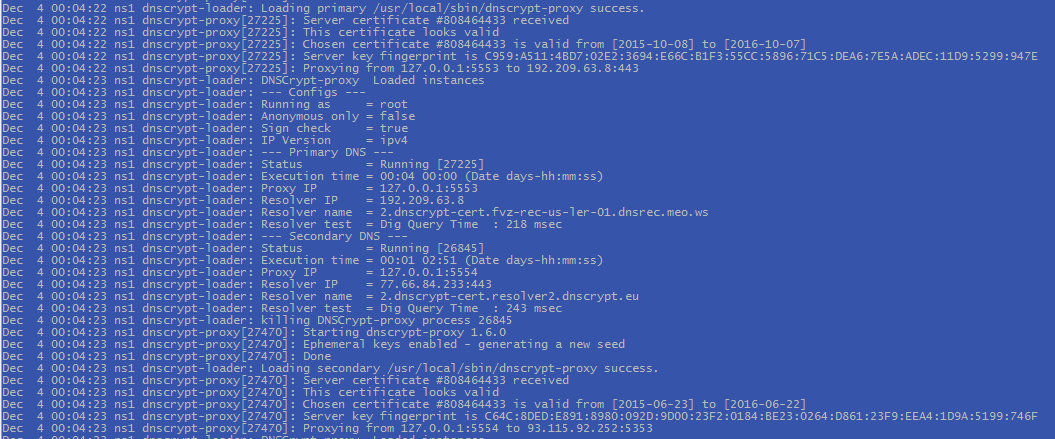
Command-line options are useful when you want to run DNSCrypt-proxy through DNSCrypt-loader in a script you created or as a scheduled task using Cron and so on, using as follows:
Show usage
dnscrypt-loader -h
Load resolvers
Loads the resolvers selected by user in interactive mode. If no resolvers previously selected DNSCrypt-loader will select the resolvers randomly.
dnscrypt-loader -d
Load resolvers randomly
Does the same as the "-d" option, but uses random resolvers only.
dnscrypt-loader -r
Change filters
You can add filter modifiers to the options "-d" and "-r"
the randomizer will restrict the resolvers to these filters. Example:
dnscrypt-loader -i ipv4 -l nolog -r
dnscrypt-loader -i ipv6 -l log -d
Update resolvers.csv
Performs download, update and signature check of the resolvers.csv file
dnscrypt-loader -u
Minisign Signature check
Performs integrity check of resolvers.csv file using Minisign
dnscrypt-loader -m
Status
Show DNSCrypt-proxy instances status
dnscrypt-loader -s
Quit DNSCrypt-proxy
Stops all instances of DNSCrypt-proxy and preserves information about the resolvers used for further session restore
dnscrypt-loader -q
Kill DNSCrypt-proxy
Stops all instances of DNSCrypt-proxy and clears all information about the resolvers used
dnscrypt-loader -k
Performs DNS leak test (IPV4)
This function is just a command line bonus. It depends of third-party software that can be changed at any time.
Note: DNS-OARC is not a DNS Leak Test site itself but produces the exactly same results when we observe the DNS Servers tested. This site was chosen because is secure and it does not use javascript, permitting download of data inside html code
No magic here. This function extracts the DNS IP addresses detected on http://entropy.dns-oarc.net/test test page. So you can check if the DNSCrypt-proxy resolvers you choosed really is working.
But the most important is verify if your real IP address is listed. If yes, it means you are not protected by VPN or if you are using DNSCrypt-proxy as Forwarder on DNS (BIND) server, the directive "Forward only;" must be applied, since this server will forward all requests and should not attempt to resolve requests on its own, bypassing DNSCrypt-proxy.
Obviously, you can use DNS Leak test pages to do the same.
Please refer to https://www.dns-oarc.net/ for details
dnscrypt-loader -x
DNSCryp-loader uses two config files located in/etc/dnscrypt-loader/
This files contains parameters used by DNSCrypt-proxy instances called primary and secondary DNS resolvers.
dcp-primary.conf
dcp-secondary.conf
The contents of the files is updated every successful execution of DNSCrypt-proxy using user selected resolvers or randomly loaded by script.
The DNSCrypt-loader retrieves these parameters when you restore a previous session or during system startup. Only well-known DNSCrypt-proxy parameters are read and processed.
In this example we add two entries in crontab, as folow:
The resolvers.csv file will be updated everyday at 23:00pm
New resolvers will be loaded randomly everyday at 13:00pm
# For details see man 4 crontabs
# Example of job definition:
# .---------------- minute (0 - 59)
# | .------------- hour (0 - 23)
# | | .---------- day of month (1 - 31)
# | | | .------- month (1 - 12) OR jan,feb,mar,apr ...
# | | | | .---- day of week (0 - 6) (Sunday=0 or 7) OR sun,mon,tue,wed,thu,fri,sat
# | | | | |
# * * * * * user-name command to be executed
0 23 * * * * root exec /usr/local/sbin/dnscrypt-loader -u
0 13 * * * * root exec /usr/local/sbin/dnscrypt-loader -r
You can redirect DNS requests of whole network to a DNS Bind server that will act as a forwarder only.
To do this, just put ip/port of DNSCrypt-proxy you set up on DNSCrypt-loader
inside of Bind forwarders clause.
Then, your DNS clients can point to your Bind server to forwarded DNS queries.
As follows:
options {
...
forward only;
forwarders {127.0.0.1 port 5553; 127.0.0.1 port 5554;};
...
}
A more selective version this setting is to use the Bind view clause for a specific set of DNS clients
that will be forwarded through DNSCrypt-proxy. For example:
acl ProxyClients { 192.168.1.0/24; };
...
view "PROXY-NETWORK" {
match-clients { ProxyClients; };
recursion yes;
forward only;
forwarders {127.0.0.1 port 5553; 127.0.0.1 port 5554;};
...
};
Please, refer to Bind documentation.
You can enable or disable DNSCrypt-loader as service using the installer, please refer to Installation topic.
Remember that the service mode is needed to load DNSCrypt-proxy resolvers at boot time.
To control all details of DNSCrypt-proxy use the dnscrypt-loader script.
Once service is enabled, depending on your Linux distro, you can control the service as follow:
On Centos and RedHat based
service dcp-loader start|stop|restart|status
or
systemctl start|stop|restart|status dcploader.service
On Ubuntu and Debian based
sudo service dcp-loader start|stop|restart|status
On openSUSE based
service dcp-loader start|stop|restart|status
Hope you enjoy using DNSCrypt-loader to manage DNCrypt-proxy.
DCL Guide Rev-4 9/18/2016
